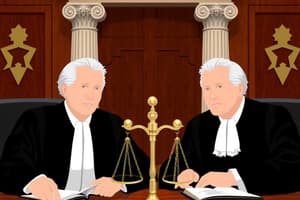Podcast
Questions and Answers
What is a Plaintiff?
What is a Plaintiff?
- A person who brings a case against another in a court of law. (correct)
- A government body that brings charges against a person.
- A judge of the supreme court.
- An individual accused in a court of law.
What is a Defendant?
What is a Defendant?
An individual, company, or institution sued or accused in a court of law.
Who is the Petitioner?
Who is the Petitioner?
The losing party who asks a higher court to review their case.
Who is the Respondent?
Who is the Respondent?
What is Prosecution?
What is Prosecution?
What are Criminal Cases?
What are Criminal Cases?
What is Concurrent Jurisdiction?
What is Concurrent Jurisdiction?
What are Trial Courts?
What are Trial Courts?
What are Appellate Courts?
What are Appellate Courts?
What is the Supreme Court?
What is the Supreme Court?
What is Jurisdiction?
What is Jurisdiction?
What are Justices?
What are Justices?
What is Subject Matter Jurisdiction?
What is Subject Matter Jurisdiction?
What are federal-question cases?
What are federal-question cases?
What are Diversity Jurisdiction Requirements?
What are Diversity Jurisdiction Requirements?
What does The Senate do regarding federal judges?
What does The Senate do regarding federal judges?
What is The President's role in judicial nominations?
What is The President's role in judicial nominations?
Why is the life term for federal judges important?
Why is the life term for federal judges important?
What is a Verdict?
What is a Verdict?
What is Federalism?
What is Federalism?
Flashcards are hidden until you start studying
Study Notes
Legal Terminology
- Plaintiff: The person initiating a lawsuit in a civil case, seeking remedy against another party.
- Defendant: The individual, company, or institution being accused or sued in a court of law.
- Petitioner: The party who lost in a lower court and requests a higher court to review the case decision.
- Respondent: The party opposing a petition for appeal, typically the one who prevailed in the prior ruling.
Case Types and Structure
- Prosecution: Government entity responsible for bringing charges in a criminal case against an accused individual.
- Criminal Cases: Legal cases involving state laws that define criminal behavior and corresponding penalties.
- Concurrent Jurisdiction: Situations where both state and federal courts can hear and adjudicate the same case.
- Trial Courts: Courts that handle the initial proceedings of a case, establishing relevant facts and applying the law.
- Appellate Courts: Courts that review trial court decisions to ensure correct legal application without re-evaluating factual evidence.
Court Hierarchy
- Supreme Court: The apex judicial body in a country or state, holding the highest authority in legal matters.
- Jurisdiction: The legal authority of a court to hear a specific case, determining the scope of its power.
- Justices: Judges serving on the Supreme Court, tasked with making significant legal decisions.
Jurisdiction Types
- Subject Matter Jurisdiction: The specific types of cases that can only be heard in federal court, such as military or immigration cases.
- Federal-Question Cases: Cases related to constitutional issues, federal laws, or treaties that fall under federal court jurisdiction.
- Diversity Jurisdiction Requirements: Scenarios allowing federal court jurisdiction when parties reside in different states and the amount in dispute exceeds $75,000.
Judicial Nominations
- The Senate: Plays a critical role in confirming presidential nominations for federal judges, providing checks and balances.
- The President: Responsible for nominating federal judges and forwarding these nominations to the Senate for approval.
- Life Term for Federal Judges: Ensures judicial impartiality by insulating judges from political pressures, permitting them to make unbiased decisions.
Legal Outcomes
- Verdict: The decision reached by a jury in a trial, determining the outcome of the case.
- Federalism: The division of powers between national and state governments, establishing a system of governance in the U.S.
Studying That Suits You
Use AI to generate personalized quizzes and flashcards to suit your learning preferences.




